L.A.-area residents flock to Taiwan to vote in ‘do or die’ presidential election
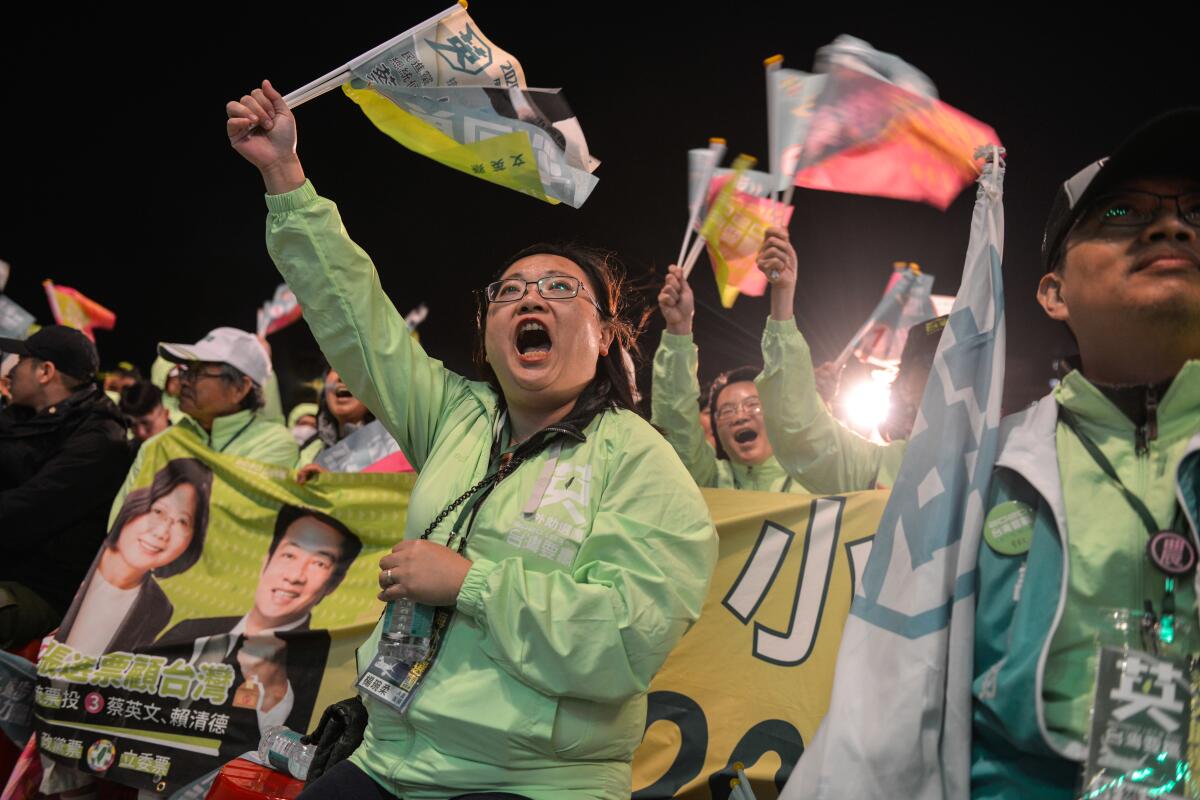
- Share via
TAIPEI, Taiwan — As Taiwanese President Tsai Ing-wen finished her stump speech, Wendy Yang hopped up and down, shaking a campaign flag and grinning from ear to ear.
“Elect Tsai! Elect Tsai!” the Torrance resident shouted along with a crowd of hundreds hoping to see the president win a second term when voters across Taiwan go to the polls Saturday.
Next to Yang in the front row at the Wednesday rally in Taoyuan, just west of Taipei, Taiwan’s capital, were other Californians who had flown across the Pacific to cast their votes in an election that will determine the island’s relationship to China for the next four years, with Hong Kong’s pro-democracy protests looming as a backdrop.
Though they have lived in the U.S. for decades, Yang and the nearly 150 people in the Friends of Tsai Overseas group maintain dual citizenship and a deep emotional investment in Taiwan, which transitioned from authoritarian rule to democracy in the 1990s.
Supporters of the Kuomintang political party, also known as KMT or the Nationalist Party, also have arrived in force from California to cast ballots for their candidate, Han Kuo-yu, 62, mayor of the international port city of Kaohsiung, who favors closer ties to China than Tsai’s Democratic Progressive Party, or DPP.
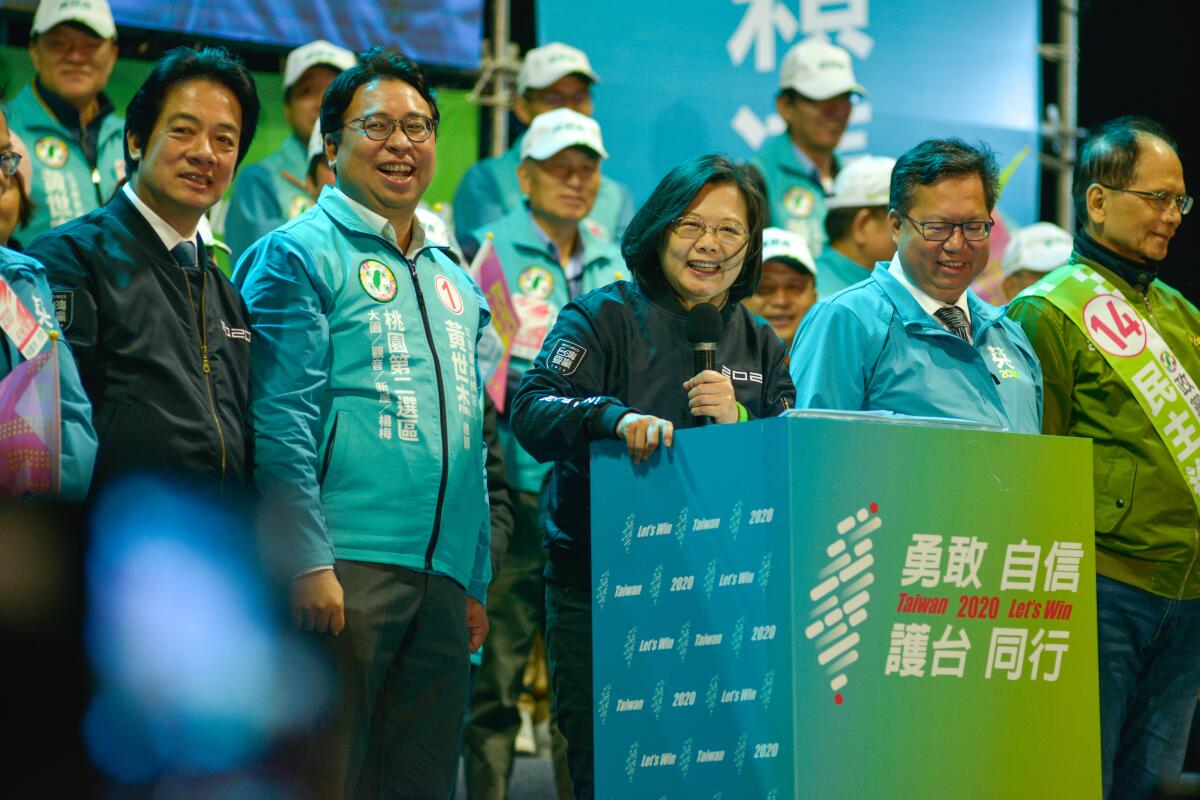
According to the U.S. census, more than 300,000 people in Southern California identify as Taiwanese American, which is probably an undercount because some with roots on the island consider themselves Chinese.
A KMT advisor estimates that the turnout for voters returning from overseas is about 20,000 for his party alone, with many hailing from California. Leading up to the election, seats from Los Angeles on the two major Taiwanese airlines, China Airlines and EVA Air, have been full and cost more than usual, occupied by voters as well as travelers spending the upcoming Lunar New Year in Taiwan.
On an island of 23 million people, expatriates are unlikely to sway the election. But Taiwanese say they are inspired by the dedication of those who traveled halfway around the world to vote.
“This is as important to us as the American presidential election, if not more,” said Ken Wu, secretary-general of the Taiwan Center Foundation of Greater Los Angeles. “Taiwan is such a small country. If we as Taiwanese don’t care about our future, who will?”
Wu, who endorses Tsai, said longtime U.S. citizens return to Taiwan to vote because they have experienced American democracy and want the same for their homeland.
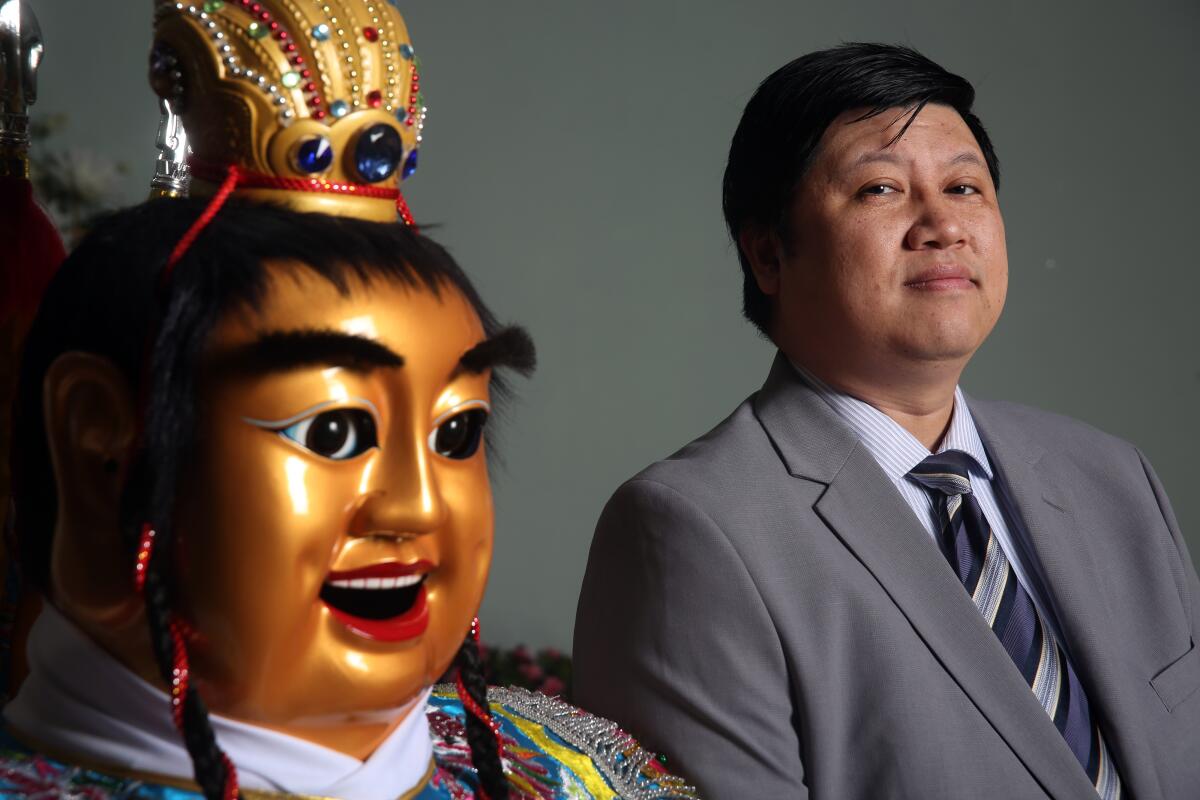
Like many other immigrants in Southern California, Taiwanese expatriates keep close tabs on events back home. As the Saturday election approaches, many are tuning in to Taiwanese television stations broadcasting nonstop coverage of campaign rallies, mudslinging and talking-head analysis.
Both parties agree that Taiwan’s future is at stake but differ on who should lead it, a political gulf as profound as America’s red-blue divide.
Tsai, 63, a U.S.- and London-educated former law professor who became Taiwan’s first female president in 2016, has a substantial lead in public opinion polls, with James Soong of the center-right People First Party a distant third. The KMT is hoping for a Trump-like turnaround to prove the polls wrong.
Yang took time off from her work as an attorney to lead the Friends of Tsai Overseas group, whose members paid up to $1,300 each for a seven-day campaign tour for Tsai around the island.
As a junior high student, Yang marched in protests in Taipei against martial law before moving to California in 1992. She is involved in U.S. politics as a Trump supporter who attends a monthly South Bay Republican discussion group.
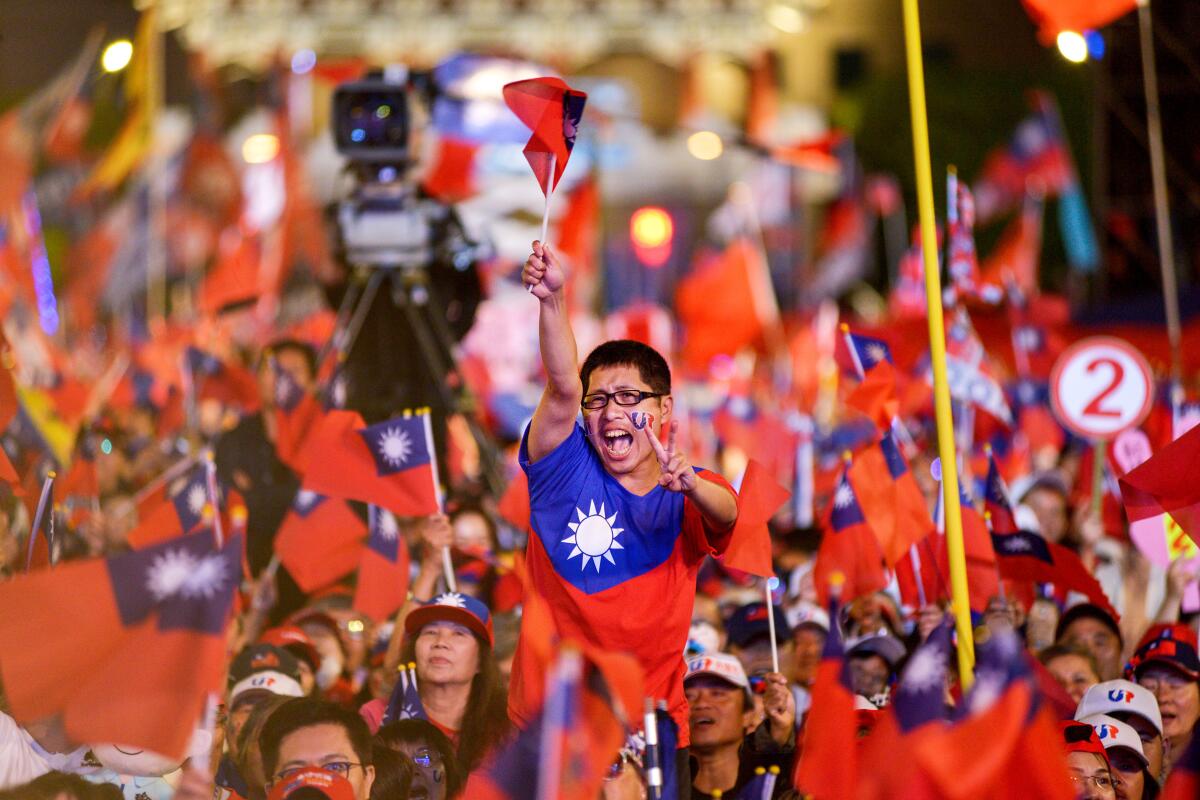
If Han, the KMT candidate, wins, she fears that Taiwan’s hard-won political freedoms will be eroded by China, which views the self-governing island as a renegade province and is eager to reclaim it.
“It’s dangerous for democracy, for the people, for the economy, to be so closely tied to China,” said Yang, 43. “Taiwan belongs to the world, not China.”
But in Taipei, the day after the rally in Taoyuan for Tsai, several Southern California residents supporting Han emerged from a subway station, announcing that they had come straight from the airport.
With the price of direct flights from L.A. to Taipei through the roof, they had found cheaper tickets by changing planes in the Chinese city of Xiamen to arrive just in time for a giant Han rally.
As Han supporters streamed past, waving red, white and blue KMT flags and decked out in KMT hats, T-shirts and face tattoos, the California group described the election as “do or die” for maintaining economic development and avoiding conflict with China.
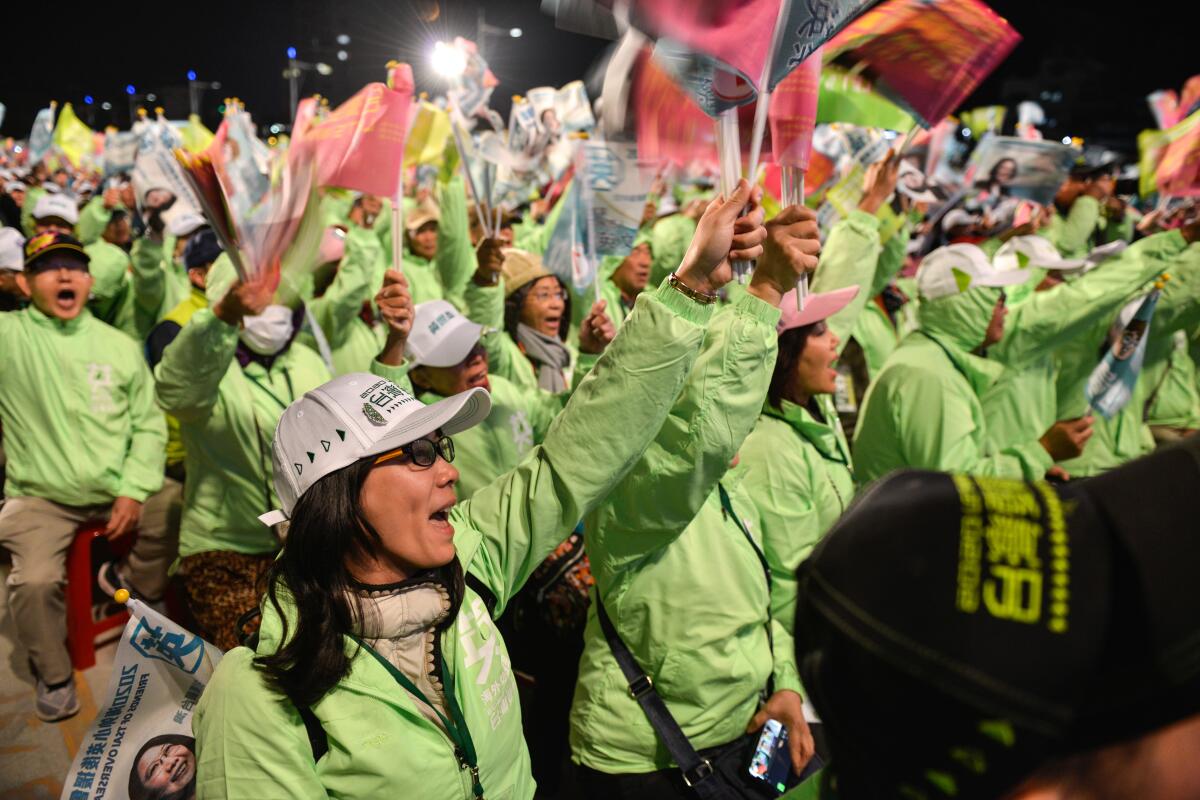
In nearly four years as president, Tsai has damaged relations with China and curtailed freedom of speech with recent legislation aimed at restricting Chinese infiltration, said Jim, 70, a member of the California contingent from the South Bay who did not want to give his full name because it would endanger his job.
Jim believes that Tsai wants to declare independence from China — though she does not explicitly say it — a stance that could cause China to attack.
Chanel Lee of Chino, president of the Taiwan Benevolent Assn. of America, a pro-KMT organization that claims thousands of members, welcomed the California arrivals, who joined others from Miami, Washington, Chicago and elsewhere to pose for photos behind a red and blue banner, holding up two fingers to indicate Han’s “No. 2” ballot number.
Lee, who wore a KMT bandanna around her neck, had tried to reserve seats near the stage, but others had beaten her to it, camping out since early that morning.
So the group, which had thinned to a handful of people as some split off in the increasingly congested streets, staked out an area toward the back of the crowd, clutching their banner, which indicated they were from overseas and drew attention from passersby.
Local news reports estimated that 400,000 people attended the rally.
“Welcome, welcome!” a woman said.
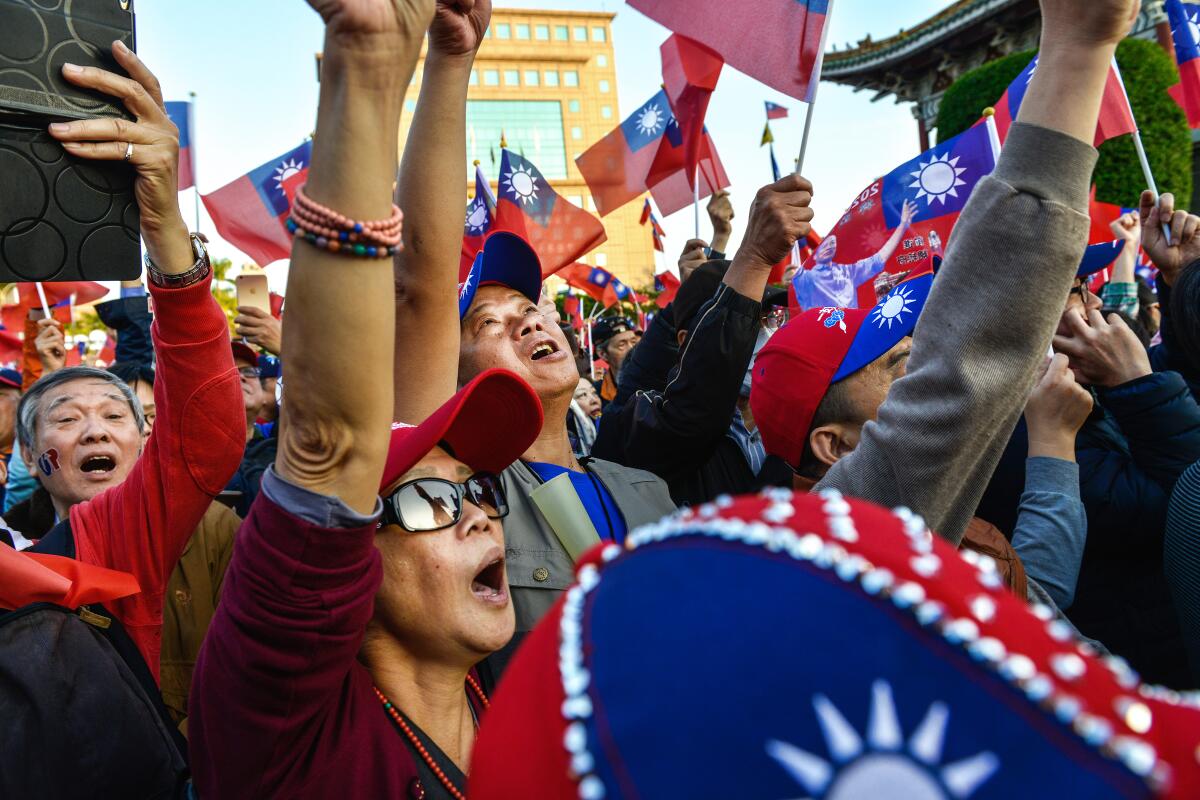
“Thank you for coming back!” said a man with two KMT flags tucked between his shoulders.
When Han took the stage four hours later, he began by thanking supporters who had journeyed from abroad.
“I know it was difficult for everyone to get here. Buying round-trip tickets probably cost thousands of dollars,” he said. “We are really, really moved by this kind of enthusiasm, and we really, really thank you.”
Lee, a retired skin-care saleswoman, moved to California 32 years ago so that her children could have an American education. She votes in U.S. presidential elections but acknowledges that she is more passionate about Taiwanese politics.
Under Tsai, Taiwanese people are struggling, and Taiwan has lost some of its few diplomatic allies as China intensified a campaign to win over those countries, Lee said. Because China does not acknowledge Taiwan as independent, nations can have diplomatic relations only with one or the other, not both. Most have chosen China and its economic clout.
Although Taiwan’s economy under Tsai has experienced its fastest growth in two decades, and the island has benefited from the U.S.-China trade war, per capita incomes haven’t kept pace with the boom.
“We’ve become very isolated,” Lee said. “Tsai has done a bad job and should step down. The economy isn’t good. People’s lives aren’t good.”
The ongoing street protests in Hong Kong against Chinese control have resonated with Taiwanese Americans, particularly young people, said Abraham Wen-Shang Chu, who heads the Taipei Economic and Cultural Office in Los Angeles. TECO performs the functions of a consulate but operates under an ambiguous name because China does not allow full diplomatic recognition for Taiwan.
Last January, Chinese President Xi Jinping emphasized that the “one country, two systems” model of Hong Kong is the only acceptable path for Taiwan.
Neither the KMT nor the DPP supports that structure, with the unrest in Hong Kong highlighting its potential shortcomings.
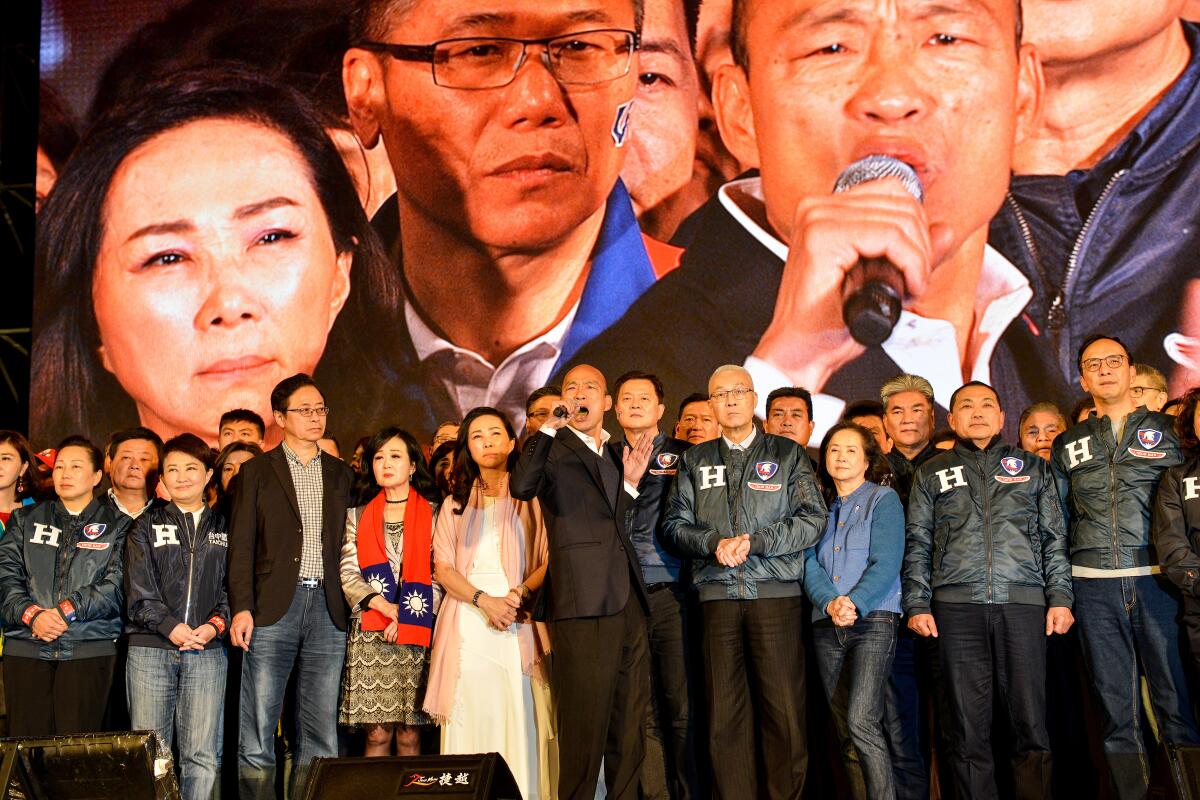
“When they see their peers, so many university students of the same age put themselves in front of danger, it makes them think a little bit more deeply about politics and the importance of showing your voice,” Chu said of young voters.
Chu said he has heard of older voters in their 80s and 90s braving the 14-hour flight to vote because they grew up in a Taiwan that was not free and “treasure the fact that a democracy exists.”
“We don’t want Taiwan to be a second Hong Kong,” Kim Wu, 69, a retired information technology specialist from Walnut, said at the Taoyuan rally for Tsai on Wednesday.
Jerome Chen, 67, of Hacienda Heights helped the Friends of Tsai Overseas group score their front-row seats with connections built from leading a California contingent every four years since Taiwan’s first presidential election in 1996.
“When we went to the U.S., we experienced liberty,” said Chen, a retired clothing importer. “We want to do everything American style. The KMT likes to be like China.”
Clad in lime green windbreakers, the group has traveled around Taiwan this week, knocking on doors and cheering at rallies. Most are from the San Gabriel Valley, with others from Orange County, San Diego, Fresno and San Jose.
Before Tsai took the stage, an emcee led the crowd in a Taiwanese folk song. In the California section, a man in a black baseball hat sang along, tears streaming down his face.
Special correspondent Ralph Jennings and Times staff writer Jennifer Lu contributed to this report.
More to Read
Sign up for Essential California
The most important California stories and recommendations in your inbox every morning.
You may occasionally receive promotional content from the Los Angeles Times.












